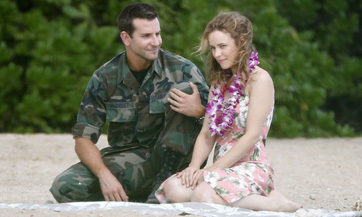|
|
Movie Review: AlohaBy Matthew HuntleyJune 8, 2015
A military attack in Afghanistan left Brian permanently scarred and out of commission, but now he’s back in the game and returning to Honolulu, Hawaii, where he was once stationed. Once again peddling a contract for Welch, he’s there to convince the locals to let Welch’s company buy the sky above their land so it can launch a new satellite and thus help bring the 50th state into the modern communications age, although Welch’s intentions aren’t altruistic as either he or Brian would have us believe. Immediately upon stepping off the plane, Brian is greeted by Allison Ng (Emma Stone), an Air Force handler who will serve as his chaperone. She tells him her last name is like “Ring” only without the “Ri.” In fact, she tells him a lot of things…fast. Allison is a by-the-books go-getter, not to mention an incessant talker, and she’s also obviously infatuated by Brian and his big blue eyes. But Brian’s eyes veer more toward his ex-girlfriend, Tracy (Rachel McAdams), who may or may not share the same feelings. They haven’t seen each other for 13 years and she’s now married to John (John Krasinski), a man of few words and possibly fewer emotions. Despite having two kids, Tracy and John’s marriage teeters on the brink of collapse, and one of the running questions throughout the film is whether or not Brian’s visit will push it over the edge. The morality surrounding the satellite and his increasingly complicated relationships with Ng and Tracy give Brian plenty to think about over the next few days, but unfortunately these developments don’t give us a whole lot to care about, probably because we can mostly guess where they’re going. Neither really takes off as something essential or entertaining, and so we just sort of watch Aloha idly and unenthusiastically as it approaches its foregone (and rather sappy) conclusion. The movie is sometimes funny, sometimes romantic, and sometimes heartwarming, but it’s not enough of anything to bear much consequence to us. And even though they have a lot in common, Aloha is not up to the same level of quality as Jerry Maguire, which had more memorable dialogue, a more intriguing romance, and an energetic punch from Cuba Gooding Jr. If Aloha does have one thing that stands out, it’s a dance scene that proves Bill Murray can certainly cut a rug, and while that was a sight to see, it’s doesn’t warrant a recommendation. Sorry, Bill.
|

|
|
|

|
Thursday, October 31, 2024
© 2024 Box Office Prophets, a division of One Of Us, Inc.


